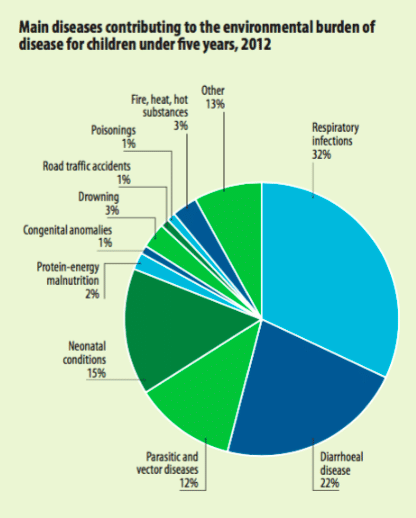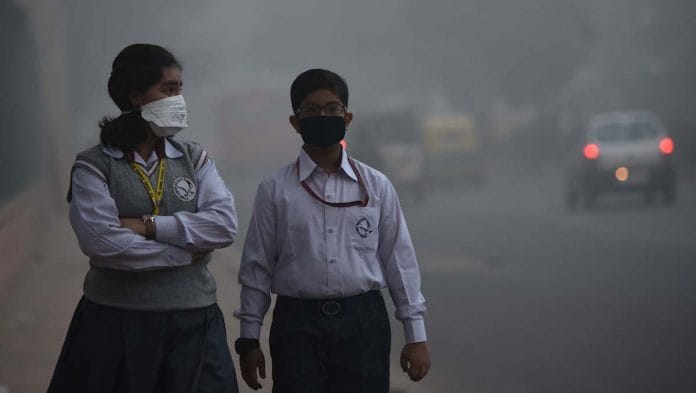Two-hour cracker burning window and knee-jerk policies are not going to save our children from air pollution, writes a paediatrician.
As air pollution in India rises, a new report raises further concerns by revealing that air pollution can now breach the safeguard of the womb. The report found, for the first time, pollution particles in the placenta of pregnant women. When pregnant mothers inhale harmful particulate matter, found in air pollution, it traverses the placenta through the blood. The findings show just how dangerous the air we are breathing is and the adverse impact it can have on even the unborn foetus.
The exposure to toxic air pollution increases the risk of preterm birth, low weight at birth, infant mortality (including from sudden infant death syndrome), poor neurodevelopment and respiratory complications in childhood.
This finding combined with the World Health Organization’s (WHO) recent report, Air Pollution and Child Health: Prescribing Clean Air, emphasises the deadly impact of children’s exposure to air pollution. In low and middle-income countries, such as India, close to 98 per cent of children under five years breathe toxic air that drastically exceeds the WHO’s air quality standards. In 2016, India shouldered the highest burden of air pollution-induced deaths of children below five with over 1 lakh children unable to reach their fifth birthday. Following preterm birth, pneumonia, an illness impacted by air pollution, has been found as the leading cause of under-five mortality.
Also read: 98% of India’s children breathing in toxic air, not just outside but also at home: WHO
Although air pollution impacts us all, children are far more vulnerable. Fine particles in the air, specifically PM 2.5 or particulate matter less than 2.5 micrometres in diameter, get into the bloodstream, and adversely impact the physiological functioning and healthy development of a child. Because children’s alveoli, or air sacs, have a larger surface in relation to volume, children inhale relatively more air than adults. By crossing the infant’s immature blood-brain barrier, pollutants disrupt the normal brain development, so that the child may not achieve optimal brain function.
Children spend a vast amount of time playing outdoors and their short stature puts them closer to the ground, where pollution is more concentrated. While not discussed as widely, indoor pollution is a major concern for children—in 2016, this source of pollution contributed to the deaths of around 67,000 children below five. Infants and young ones are held by their mothers who often handle the cooking at the home. In rural India, where over two-thirds of the Indian population resides, cooking with unprocessed solid biomass fuels is the norm. A study based in China found that prevalence of respiratory symptoms was greater among children living in proximity to a busy road, those living near chimneys or a factory, those having a coal-burning device, those living with smokers, and those living in a home that had been recently been renovated.
Also read: There’s a 50% rise in heart diseases in India. Blame salt, sugar and air pollution
Of all the deaths among children under five, over a quarter were attributable to the environment in 2016. According to another study, respiratory infections accounted for 32 per cent of the environmental burden of disease among children in 2012.

Source: WHO (2017), Inheriting a Sustainable World?
Given India’s prevailing struggle with under-five mortality, the new findings call for a relook at actions tackling air pollution and policies promoting child health. The government cannot afford to procrastinate till the situation worsens every winter before a sudden wake-up call jolts us into taking action and demanding policy changes—we must follow a preventive and planned approach.
Air pollution does not regard age or respect city borders.
Long-term, multi-sectoral policies that account for pollution levels across regional landscapes need to be planned well in advance. Shifting to cleaner fuels and energy-efficient technologies for cooking and transportation must be encouraged. Knee-jerk reactions such as declaring a two-hour window to light crackers are inadequate attempts at curbing air pollution.
Also read: How to choose the right pollution mask that will help you survive Delhi’s toxic air
As a paediatrician, I am often asked about what more can be done for children. At the household level, parents can make conscious decisions to counter the effects of pollution their children face. Breastfeeding is a key intervention to improve infant respiratory symptoms. Schools and communities should plan outdoor activities keeping Air Quality Index figures in mind. Rather than relying on face masks as a temporary fix, we can celebrate a cracker-free Diwali this year, start segregating waste, recycle and reuse, opt for public transportation and most importantly, raise air pollution as a political priority. Ultimately, the onus lies equally on each and every individual to assume their share of responsibility.
The writing is on the wall—the effects of air pollution are detrimental and require immediate attention. Whether in utero or in childhood, exposure to poisonous air has chronic health complications. Air pollution is suffocating the potential of our children—born or unborn. Just as we wouldn’t allow our young children to smoke cigarettes, we cannot let them grow up surrounded by noxious air.
The author is Executive Director-Elect, International Pediatric Association (IPA), and Director, Deep Children’s Hospital and Research Centre, Gandhidham, Gujarat. He has previously served as the president of Indian Academy of Paediatricians (IAP) and has been part of the Indian Expert Advisory Group on Polio, which was instrumental in the elimination of polio from India.Twitter: @naveenthacker






